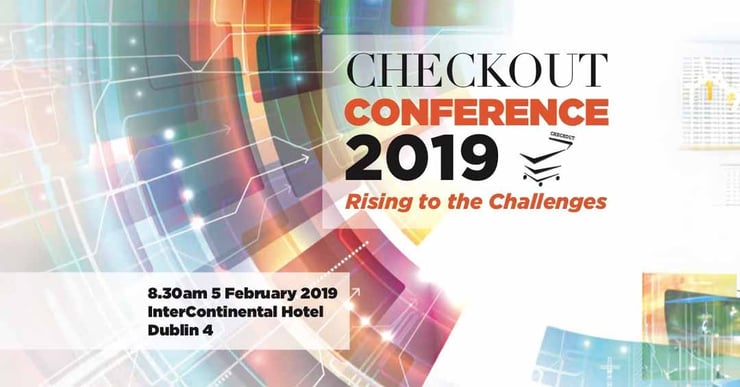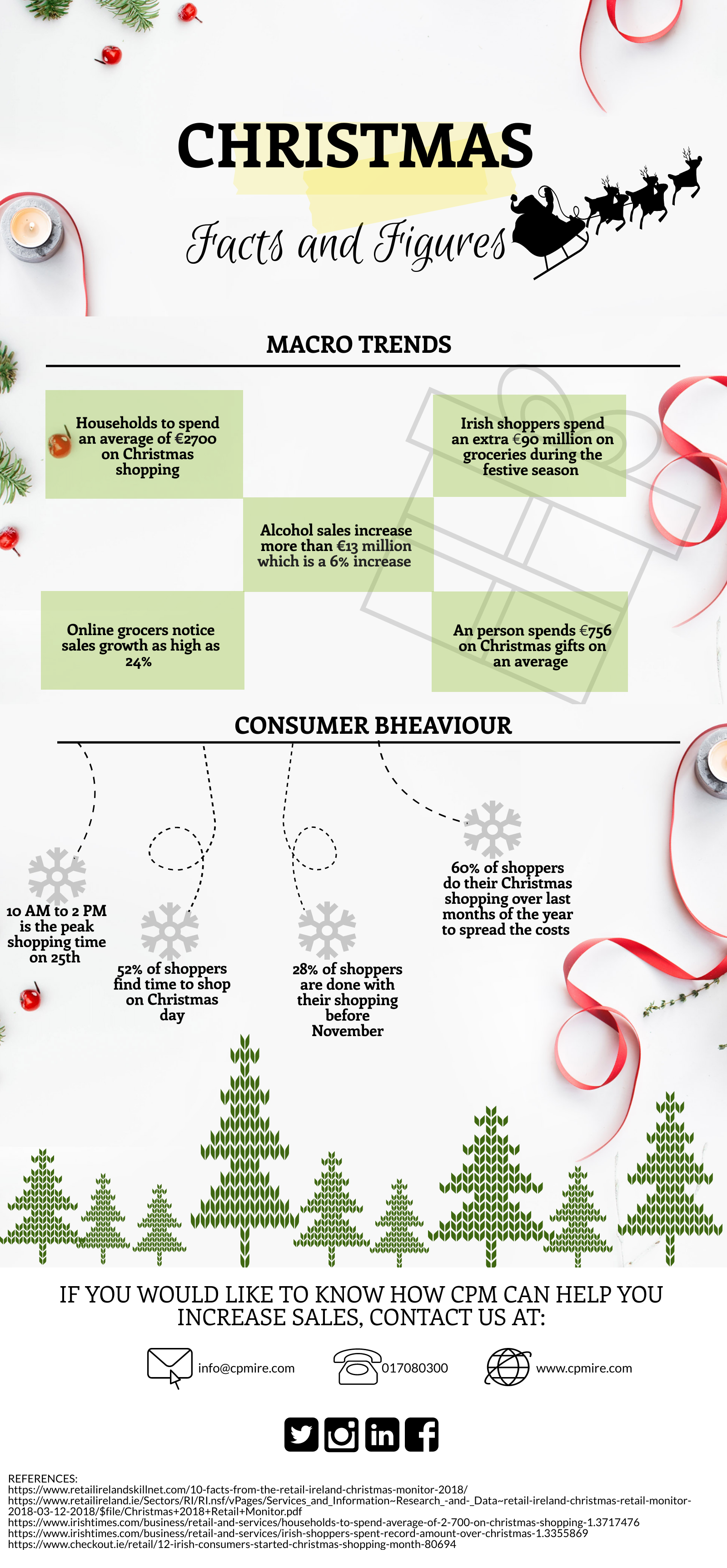
The Checkout Conference was held on February 5th at the Intercontinental Hotel in Dublin. The event gathered 8 speakers and a discussion panel, who offered valuable insights on “Rising the Challenges” in the retail industry. The conference is considered a must-attend event for senior executives in the trade and this year the conference is celebrating their 40th anniversary.
Retail experts and analysts from Ireland and overseas revealed the latest developments of the sector, as well as sharing tips and tricks that have helped them find success in a continually turbulent industry for retailers and FMCG brands.
At CPM we have gathered the main highlights of the day:
The opening speaker of the Conference was Kari Daniels, CEO of Tesco Ireland. In one of her first public appearances to the Irish grocery retail market since her appointment in September 2018, Daniels highlighted that retailers need to understand consumers and listen carefully to what they actually want from their retailers. Today’s consumers are time poor and tend to shop little and often, with a major focus on healthy eating while becoming more and more environmentally aware. They expect stores not only to deliver a great experience, but also offer to convenience and home shopping capabilities.
The concept of value is being redefined and technology is changing how retailers serve their customers, with important improvements being made in AI. For Tesco, the “scan as you shop” technology has been a key cost-saving initiative. Daniels also discussed topics such as single use plastic, environment awareness and food waste, highlighting Tesco’s main contributions in this area.
Mike Watkins, Head of Retailer and Business Insight at Nielsen, examined the macro-trends in the retail market across Ireland and Europe. Watkins addressed three specific challenges facing retailers and FMCG brands: firstly, consumers are shopping and spending differently; secondly, there has been an increase in online grocery and food delivery; and lastly, the rise of the Sustainable Shopper.
Today’s consumer journey is getting more personal, with noticeable shifts on how shoppers discover new products, embrace the shopping experience and ultimately explore with new channels, new missions and new products. According to Watkins, last year shoppers experimented with their shopping, trying new channels and seeking new experiences, such as online shopping, as opposed to shopping missions. The retail landscape continues to evolve with some key trends: consumers continue to spend (in 2018 Irish shoppers spent €16.9 billion on FMCG products) but are uncertain about Brexit; Confectionery, soft drinks and BWS are among the fastest growing categories and Discounters continue to grow market share.
Online grocery expectations are changing and the top reasons for online shopping are the ability to choose when groceries will be delivered, as well as a quicker and more convenient service. Watkins anticipates that the growth in online will accelerate as fast and convenient delivery/ collection allows retailers to cater for different shopping missions and gives the end user the possibility to customise and personalise their experience. It’s crucial for retailers to use new technologies to remain relevant and offer a seamless experience to customers.
As we are witnessing the rise of the sustainable shopper, Watkins suggested that products that are fresh, natural, local or craft produce, with smaller serve packs and which are perceived as better for the environment will drive retail growth. In Ireland we are seeing that shoppers are environmentally conscious with clear expectations of sustainability: 46% of consumers are seeking loose products with no packaging. Also 91% of consumers believe retailers should do more to reduce the amount of plastic packaging.
Seamus Griffin, Chief Executive of Griffin Retail Group, offered a very inspiring talk as he walked the audience through the story of how the retail group grow with a mindset of “failure is never an option on the way to success”. Griffin Retail Group started with a shop in 1950 and now they run 15 stores in Dublin, employing 400 people. Griffin explored the challenges that brick and mortar retailers are facing in today’s open and hyper competitive marketplace, agreeing that the key to overcoming them is to provide a great customer experience at any point. He also talked about the threat of spiralling insurance and labour costs for retailers.
Griffin shared the experience the group has had with the concession model and how it is transforming convenience retailing, creating one-stop shops for a variety of local services and food offerings. The introduction of the Subway concession to the retail chain was key to drive additional footfall and turnover. When looking ahead Griffin estimates that the average consumer will 'dashboard dine' at least four times during the week, with a surge of consumers eating in the car on the way to work, giving a major opportunity to the grab and go sector.
Lord Mark Price, former Managing Director at Waitrose, believes the real challenge facing retailers and brands is how they prepare their staff to cope with the new technological age. For him the importance of workplace happiness is crucial for achieving great results: profit and productivity increases in 20% when employees are engaged with their companies, which also reduces waste, staff turnover and sick absences.
In order to achieve employee engagement companies must reward and recognise their staff upon success, empower and trust them as well as keep them well informed. It is also advisable to guarantee a good life-work balance, create in employees a sense of pride and guarantee job satisfaction levels are always optimum.
Malachy O’Connor, founder at Food First Consulting, and partner at International Private Label Consult, summarised the current market dynamics and demonstrated how these trends pose major challenges for brands such as discounter market share growth, the growing price differential and changing promotional strategies. To set the scene, O’Connor talked about the current volatility of the market and discussed the success discounters had when establishing in Ireland and how the other retailers responded.
In Ireland it is estimated that there is one discounter shop per 15,000 people (this is 5,000 in Germany and 25,000 in the UK), which exposes major potential for discounters to continue driving store growth. Another area which has big potential is private labels as there is currently low market penetration in some categories. The Irish consumer has an affinity with brands and premium private labels. There is also a big opportunity for delivering true innovation, especially in the areas of health and sustainability. However, it all boils down to delivering consistent quality. Brands should never compromise in quality.
Peter Stedman, Managing Director, at Salvus Food Consulting, explained what sustainability means in the Irish context and how the Irish Grocery retail sector compares to its European counterparts. Stedman believes that governments need to set rules to get all the industry to act and move sustainably. In the meantime, it’s crucial for businesses to design and implement a sustainability plan. Some of the upcoming trends are spreading global legislation, designing good enough products that can be repaired when break down as well as healthy sustainable diets.
Adam Smith, Head of Media Strategy at dunnhumby UK, presented some research around the increasing debate between a mass marketing approach vs a data led approach. Smith analysed if different categories behave similar to the Pareto law (80/20) or to Sharp’s law (50/20). The key results showed that even though categories can behave very differently, it seems that the 80/20 view of sales to top customers appeared to be more accurate than the 50/20 view, as the heaviest 20% of brand buyers are typically responsible for 65-80% of a brand’s sales. This will also depend on the category dynamics, as emotional brands behave different than functional ones. Also, the smaller the brand, the higher the proportion of sales to the top 20% of consumers. In order to maximise the marketing and media budgets, Smith recommended a tailored category and brand strategy.
Last but not least, Zana Busby, Business and Consumer Psychologist at Retail Reflections, shared what, how and why people buy. As human beings, 80% of our actions are emotion driven and 20% are rational and logical. According to Busby, most of the consumer spending happens on the subconscious level. Whether we shop online or off line, our emotions play a major role when purchasing a product. It’s very important that brands have access to emotional driven insights in order to cultivate positive emotions and memories on their customers. The happier the emotion and experience that the brands generate on the customer, the more engaged the buyer will be.
Busby also addressed the different shopping patterns between men and women. For men, shopping is considered a mission, and even though emotions also play an important role they are driven by data. On the other hand, women see shopping as a journey and they have more hedonic and emotional responses to the act of shopping. It is important not to underestimate the buying power of women, as they addressed 80% of discretionary spending.
She also explained that humans tend to link the senses with emotion (either positive of negative), so it is crucial for brands to engage their customers with the 5 senses in order to drive positive emotions, wonderful experiences and great relationships.
The Conference concluded with the Leaders Panel, which consisted of John McCambridge, Head of Sales at Heineken Ireland; Stephen Dillon, Head of Planning at Mondelez and Malachy O’Connor, all joined by Panel Chair, Conor Morris, Managing Director of the Executive Institute. The panel discussed the different initiatives and views around sustainability, packaging and plastic reduction, how to engage and communicate with the customer, and how technology is being by their brands.
At CPM our Mission is to grow our clients’ business using insight to create influence and drive sales. CPM works as a strategic partner with all of our clients. We work closely with them to ensure that we are constantly reviewing the emerging trends in the market and in turn growing and evolving. If you would like to talk to someone at CPM about how your brand can rise to the challenges in retail, please contact us on 01 7080300, email info@cpmire.com or visit www.cpmire.com





